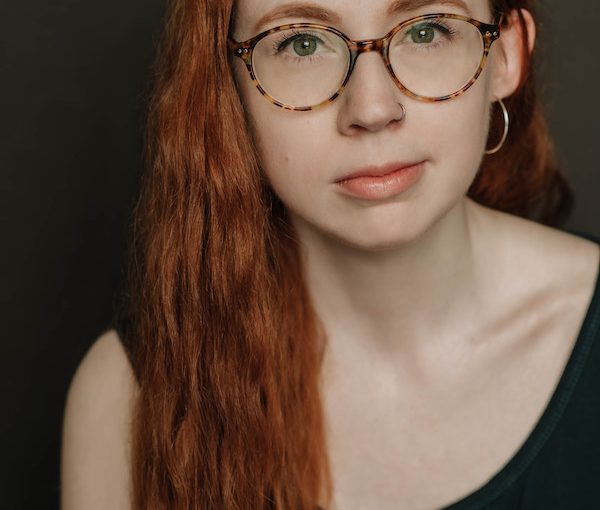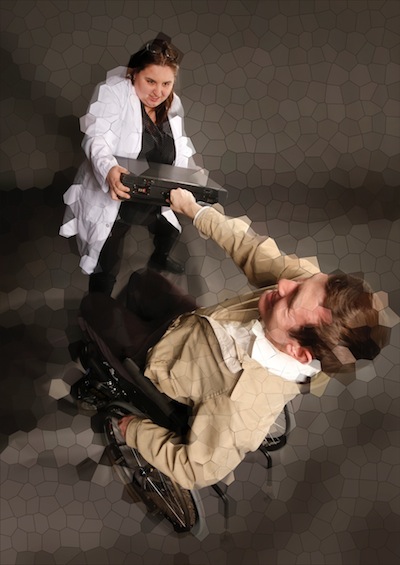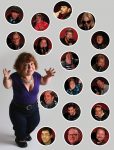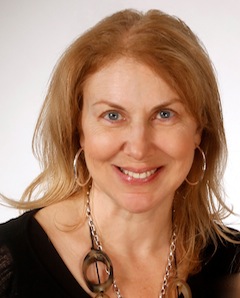Cadence Rush Quibell has their debut at Theatre Under the Stars this summer. (photo by Veronica Bonderud / The Portrait Sessions)
Cadence Rush Quibell makes their debut with Theatre Under the Stars (TUTS) this summer in The Prom, which alternates with Matilda, until Aug. 26 at the Malkin Bowl in Stanley Park.
Growing up in Port Coquitlam, Rush Quibell was homeschooled from Grade 2 to Grade 10. As a young person, they took up musical theatre, joining a junior, amateur-level production company.
“It was the only thing to do,” they told the Independent. “It was what all the homeschool kids did at the time.”
Musical theatre felt comfortable and aligned with their strong sense of creativity. “It was totally up my alley,” they said, and it was not long until they fell in love with the art form. When they moved to a public school for grades 11 and 12, Rush Quibell upheld this passion, participating in their school’s annual productions.
Rush Quibell stopped performing after they graduated. They would regularly tell their wife Jenn how much they missed theatre but, as a wheelchair user, they felt certain that the world of theatre had no space for them. As a kid, Rush Quibell did not use a wheelchair or identify as a person with disabilities.
In the summer of 2021, Rush Quibell chanced upon a Facebook advertisement for Realwheels Theatre, which, its website explains, “creates and produces performances that deepen understanding of the disability experience. We tell stories in which disability itself is not the focus of conflict, but rather forms the landscape upon which universal issues are debated onstage.”
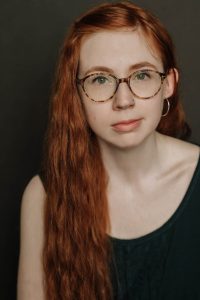
Rush Quibell found a call for auditions and “it felt perfect,” they recalled. They remember bursting into tears at the “possibility of theatre being possible for me again.” It was their wife Jenn who encouraged them to audition, despite some of Rush Quibell’s health concerns and the logistical challenge of commuting from their home in Langley to Vancouver, where the program was located. “She was there to remind me of who I am,” they said of Jenn.
Rush Quibell’s experience at Realwheels “opened a lot of doors,” they said, not only reminding them of their love for theatre, but giving industry exposure that would lead to subsequent projects. They said it was great to learn from the Realwheels instructors and to be surrounded by Vancouver’s local theatre community. Such access to advice from seasoned professionals, as well as a close community of fellow actors, was “invaluable,” they said.
This period of self-discovery, as Rush Quibell called it, coincided with an exploration of their religious identity. They were curious about exploring Judaism, despite being raised in a Christian household and distancing themselves from religion during adolescence. Their fascination with Judaism formed through conversations with Jewish friends and from connecting with Jewish people on social media. “I didn’t realize you could convert,” they said. “It was a feeling of, ‘I think I found it,’ and ‘this feels right.’” They said the community at Temple Sholom made them feel welcome and comfortable enough to explore Judaism. Days before our interview, Rush Quibell’s conversion became official.
During their time at Realwheels, Rush Quibell learned about a musical theatre course offered by the Arts Club. Musical Theatre 101, led by Peter Jorgenson, provided an amateur setting that allowed them to gain confidence for professional auditions. With this new foundation, when Rush Quibell came across a Facebook post about TUTS auditions for The Prom, they seized the opportunity. Jorgenson and other Arts Club instructors helped them prepare an audition song and organize sheet music.
After securing a role in the show’s ensemble, Rush Quibell faced the challenge of navigating their wheelchair use. TUTS was very accommodating, they said, renting a lift for them to get on and off stage – which was, admittedly, “a little terrifying” to navigate at first.
TUTS continues to remain dedicated to improving accessibility, said Rush Quibell, noting that they are not the first disabled performer at TUTS, just the first wheelchair user. “It’s difficult being the first at anything, but it is also super-rewarding,” they acknowledged.
“This is a really neat experience,” they said, highlighting the importance of authentic and diverse representation on stage.
Reflecting on their own theatre journey, Rush Quibell shared, “If I went to a show and saw a wheelchair user on stage, perhaps I would have gone into theatre sooner.” They are hopeful that their work on The Prom can set a precedent for future disabled actors who aspire to join TUTS, or the theatre in general. “We’re showing the audience and everyone I’m working with that this is a totally viable and normal thing to do,” they said.
Authenticity and acceptance are core messages of The Prom. The production follows four Broadway stars who travel to small-town Indiana to support a local student, Emma, in challenging the rules and expectations of her community so she can take her girlfriend to the prom. Rush Quibell highlighted that, while the show explicitly addresses LGBTQ+ inclusion, its themes extend to anyone seeking meaningful representation and inclusion. “We are talking about literally everyone, not just gay and straight,” they said.
Participating in TUTS has been a great experience for Rush Quibell, and they were looking forward to opening night when the Independent interviewed them.
The cast has been kind and supportive, frequently sharing information on upcoming theatre projects and auditions, said Rush Quibell, adding that The Prom’s story resonates with many of their castmates.
Rush Quibell’s role in the show’s ensemble has been “a blast” – they get to balance singing, dancing and acting, doing so with energy and enthusiasm. In this show’s ensemble, “you do everything,” they said.
Our interview ended with Rush Quibell saying The Prom promises to be a heartwarming, comedic and vibrant production a story well worth sharing in 2023.
For tickets to the show, and to Matilda, visit tuts.ca.
Alisa Bressler is a fourth-year student at Queen’s University in Kingston, Ont. She is an avid reader and writer, and the online director of the arts and culture publication MUSE Magazine. Bressler is a member of the Vancouver Jewish community, and the inaugural Baila Lazarus Jewish Journalism Intern.

